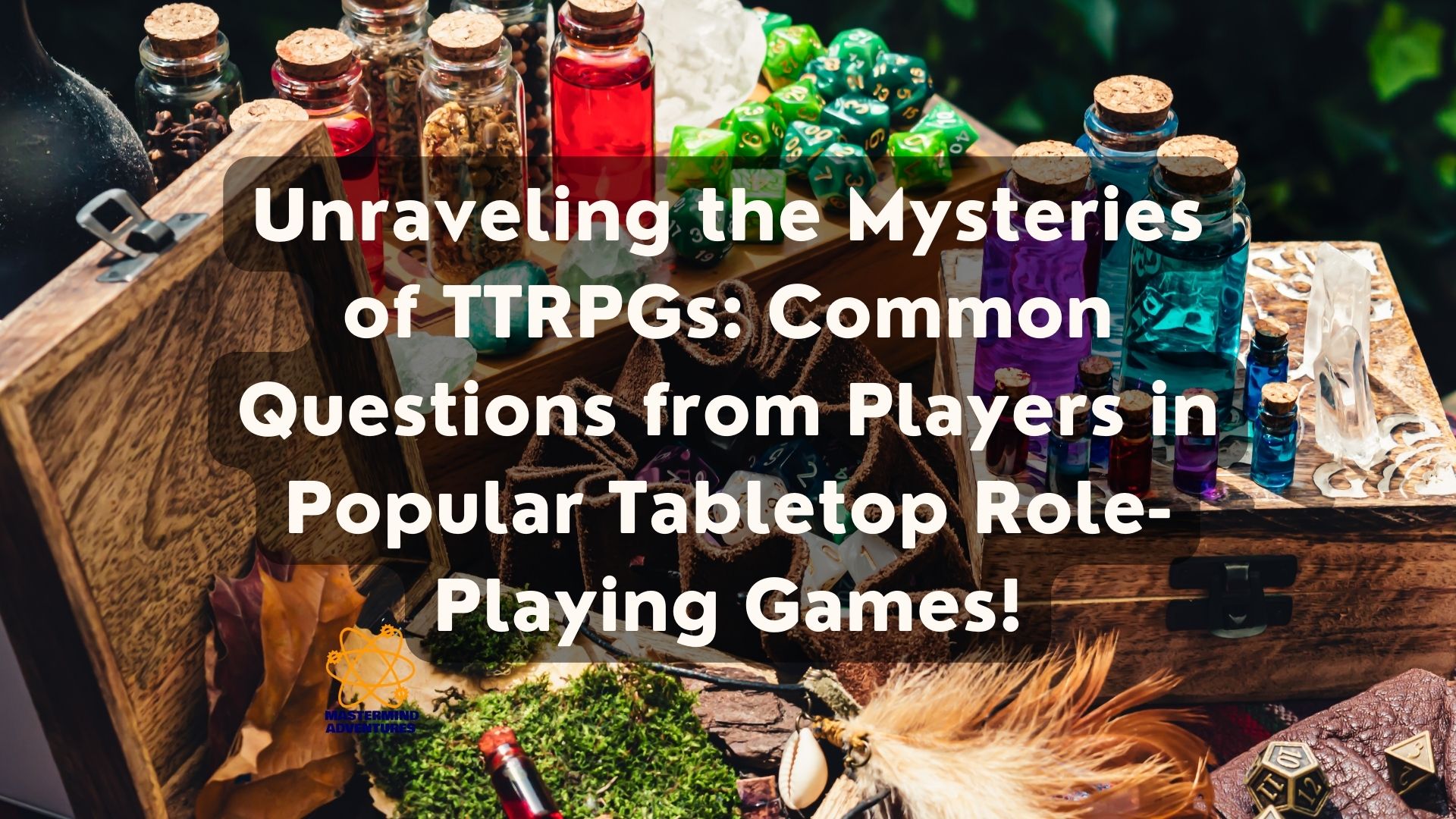In the world of tabletop role-playing games (TTRPGs), players immerse themselves in epic adventures filled with heroic feats, cunning strategies, and magical wonders. While TTRPGs offer limitless possibilities, navigating the intricacies of rules and mechanics can sometimes be challenging and even overwhelming, especially for newer players.
Players often find themselves seeking rules clarifications to fully understand how certain abilities, spells, combat, or unique situations work within the game. When working with one of the Mastermind Adventures professional game masters, we know that they are always happy to answer questions and offer support to players. But a new player may feel intimidated or feel self-conscious about what they don’t know. That’s completely normal!
In this article, we’ll explore common rules clarifications that players often seek in TTRPGs, ranging from understanding specific abilities or spells to resolving combat and handling unique in-game situations.
What do players want to know?
- Combat rules: Players often seek clarifications on how combat works, including rules related to attack rolls, damage rolls, initiative, and combat maneuvers. You may want to know about specific interactions between different abilities, spells, or weapons, or how certain conditions or status effects affect combat.
- Character creation: Players may have questions about character creation rules, such as how to allocate attribute points, choose skills or abilities, or create a backstory that fits within the game world’s lore. You may also want to clarify rules related to character advancement, leveling up, or multiclassing. (If you’re playing with one of our pros, see if you can schedule a separate session for personalized character creation!)
- Magic and spells: For TTRPG systems that include magic or spellcasting, players may have questions about how spells work, including casting time, spell components, spell ranges, spell duration, and spell effects. You may also seek clarifications on how spells interact with other game mechanics, such as combat or skill checks.
- Game mechanics: Players may want to know how certain game mechanics work, such as rules for skill checks, saving throws, ability checks, or opposed rolls. You may seek clarifications on how different abilities or skills interact with each other, or how certain actions or abilities are resolved in the game.
- Game world or setting: Players may have questions about the game world or setting, including its lore, history, geography, NPCs (non-player characters), factions, or rules related to specific locations or environments. You may want to know more about the game world’s mythology, technology, or cultures.
- Rules interpretations: Players may seek clarifications on specific rules interpretations, such as how a particular rule is intended to be applied or resolved. This could include questions about edge cases, ambiguous wording, or conflicting rules.
- House rules: Players may want to know if the game group or Game Master (GM) has implemented any house rules, which are custom rules specific to the group’s playstyle or preferences. You may seek clarifications on how these house rules affect gameplay or character abilities.
Where to get help
There are several reliable resources that tabletop roleplaying game (TTRPG) players can use to find rules clarifications and other information related to their game system. Here are some common ones:
- Official rulebooks: The primary source of rules information for any TTRPG system is the official rulebook(s) published by the game’s creator or publisher. These rulebooks typically contain comprehensive rules explanations, character creation guidelines, spell lists, and other game mechanics. Players should refer to the official rulebooks for their specific game system as the most authoritative source of information. The most common are Dungeons & Dragons, Pathfinder and Shadowrun.
- Game forums and communities: Many TTRPG systems have dedicated online forums or communities where players can discuss rules, ask questions, and share their experiences. These forums often have sections or threads dedicated to rules clarifications, where experienced players or game developers may provide insights or answers to rules questions. Examples include subreddits, forums, or Discord servers focused on a particular TTRPG system or setting. Websites like Roll20 or D&D Beyond are also great resources.
- Official websites and online resources: Many TTRPG systems have official websites or online resources that provide rules, FAQs, and other clarifications. These official online resources may be maintained by the game’s creator or publisher and can provide up-to-date information on rules interpretations, FAQs, or official rulings.
- Social media groups and communities: Social media platforms such as Facebook, Twitter, or Reddit have dedicated groups or communities focused on specific TTRPG systems or settings. Players can join these groups and engage with other players to seek rules clarifications or ask questions related to the game system you are playing.
- Game Master (GM) or fellow players: Players can always ask their GM or fellow players for rules clarifications during their game sessions. GMs are typically responsible for interpreting and applying the rules in their games, and experienced players may also be able to provide insights or clarifications based on their knowledge and experience with the system. Never hesitate to reach out to one of the Mastermind GMs. They’re happy to help!
- Online wikis and fan-made resources: Some TTRPG systems may have fan-made wikis or other online resources that provide additional information, clarifications, or homebrew content related to the game system. However, players should exercise caution and verify information from these sources, as they may not always be official or reliable.
When seeking rules clarifications or other information related to TTRPG systems, it’s important to rely on reliable sources, such as official rulebooks or reputable communities, to ensure accurate and up-to-date information. When in doubt, players should consult their GM or the official rulebooks for their specific game system for the most authoritative answers.
Happy gaming!








Leave A Comment